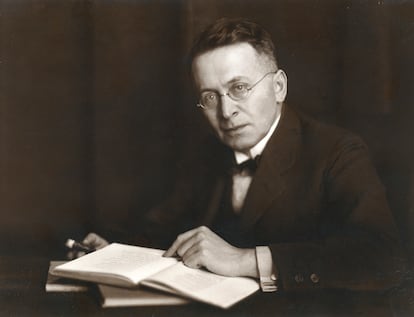To understand Trump, read the journalist who saw Hitler coming
Writer Karl Kraus anticipated the Orwellian vision of a totalitarian society influenced by doublethink that obscured the Fuhrer’s aims

The Austrian journalist, playwright, poet and satirist, Karl Kraus, published 922 issues of a magazine called Die Fackel, or The Torch, most of them produced by him alone, convinced that a misplaced comma conceals the catastrophe of an era that consents to it.
Over the course of the past 100 years, his underground influence has been far more important than recognized in the cultural arena. In fact, it is reflected in works from his Nobel Prize-winning compatriot Elfriede Jelinek to the last poet to win the Cervantes Prize, the Venezuelan, Rafael Cadenas. Now, 150 years after his birth and 125 years after he started his magazine, his thinking continues to be relevant. If the editor of The New Yorker, David Remnick, recently recalled that “The New York Times overlooked the Holocaust,” it is worth remembering that Kraus saw it coming via the newspapers circulating in Vienna 10 years earlier, including foreign ones.
The influence of Kraus and The Torch was acknowledged openly a century ago by Ludwig Wittgenstein, Sigmund Freud, Theodor Adorno, Elias Canetti and Walter Benjamin. Between 1899 and 1936, Kraus dissected some of the contemporary evils in The Torch “simply by opening the newspaper,” as the political scientist Eric Voegelin pointed out in Hitler and the Germans. Three years before Kraus’ death, in The Third Walpurgis Night, which he wrote just after National Socialism came to power in Germany in 1933, “he accurately described and revealed [the] true nature [of Nazism].” He was “the first great critic of propaganda, anticipating Orwell’s vision of a totalitarian society dominated by doublethink and newspeak,” as his biographer Edward Timms wrote in Karl Kraus Apocalyptic Satirist: Culture and Catastrophe in Hapsburg Vienna.
Language was the main occupation of Kraus; his main concern was life, and he perceived the degradation of life in the degradation of language. This intimate and tragic relationship, and his unwavering commitment to fight it, makes his analysis of Nazi propaganda not only “a must-read for every student of political science,” according to Voegelin, but for all of us. Perhaps that is why a new edition was published in the U.S. at the end of Trump’s first term. Four years later, and with the prospect of a second Trump term looming, Kraus’ voice should still be ringing in our ears.
Early this summer, Madrid’s cultural center, La Casa Encendida, included Kraus in one of its programs. The far right had not yet had their victories in the European elections, but Trump’s return to the White House was looking increasingly viable. “It’s impossible not to remember Kraus regarding current affairs, where responsibility for the public word has completely lost its value. We began to see it very clearly in the elections that Trump won in 2016, where cynicism and lies were validated as political tools,” Sandra Santana, professor of Aesthetics at the University of La Laguna in Tenerife, tells EL PAÍS.
“When words deviate from their meaning,” explains Santana in a reference essay on Kraus, titled El laberinto de la palabra or The Labyrinth of the Word, “imposture begins to reign.” According to Adan Kovacsics, a translator of works by Kraus, when it comes to the fusion of information and spectacle, Kraus warned: “It is essential to understand what the spectacle is and that politics has fused with it.” The paradox, for Kovacsics, is that, as with Trump, “everything was in plain view,” but given the machinery and skill with which Nazism hollowed out language, the era was left without words or imagination to see what it was promoting.
Trump uttered over 30,000 lies in his first term, according to The Washington Post. To understand how he has dissolved the relationship between accountability and public discourse, no need to look further than the Financial Times which quoted what an evangelical leader said about Trump days after Biden’s catastrophic debate on CNN: “As President of the United States, he kept every single promise he made to us.” The next day, FT journalist Martin Wolf pointed out that Trump’s ability “to define the truth for his followers is an example of the Führerprinzip — the idea that the leader defines the truth.” Wolf is alluding here to German jurist Carl Schmitt, one of the most influential thinkers on the new right, and his essay, The Fuhrer Protects the Law. Whoever believes that the analogy is an exaggeration, and that Trump does not even have a Schmitt, should know that perhaps Adrian Vermeule, the Harvard professor who promotes an “illiberal legalism” will suffice. The Supreme Court has already said that Trump is above the law.
Kraus understood that the aim of the message relayed by Nazi propaganda was not so much to appropriate “the atrocities as the clarifications,” just as Trump does not seek to appropriate anything in particular, except media attention, i.e. everything. When the real world ceases to be the reference, and speeches are only compared to each other, the triumph of truly self-referential politics becomes inevitable. The news is not that his running mate baptized him in 2016 as the “Hitler of the United States,” but that, if it was a criticism back then, today J.D. Vance could repeat it as praise and still appear coherent, because denouncing contradiction in Trump’s world makes no sense — contradiction is Trump’s modus operandi.
Voegelin argues that it was against this background of indifference that National Socialism also triumphed, and relies on Kraus, and his dissection of the “doublespeak of Germany,” to try to “refute all the lies that have been told about [the concentration camps], that is, the second reality elaborated by (...) the German episcopate.” Hitler’s rise to power also highlighted the failure of Social Democracy, including Austrian Social Democracy which, even when it witnessed German comrades tortured and murdered, still preferred to oppose the Austrian Christian Democratic government rather than the German National Socialists.
“Devoted to the pastime of palaver and tactics, they have lost almost all material gains,” Kraus wrote of the Social Democrats and the Social Democratic intellectuals, who believed “they could break [the] magic circle [of Nazism] by means of the Constitutional Court.” Consequently, Kraus supported the Austrian Christian-Democratic Chancellor: anything other than Hitler.
Sign up for our weekly newsletter to get more English-language news coverage from EL PAÍS USA Edition
Tu suscripción se está usando en otro dispositivo
¿Quieres añadir otro usuario a tu suscripción?
Si continúas leyendo en este dispositivo, no se podrá leer en el otro.
FlechaTu suscripción se está usando en otro dispositivo y solo puedes acceder a EL PAÍS desde un dispositivo a la vez.
Si quieres compartir tu cuenta, cambia tu suscripción a la modalidad Premium, así podrás añadir otro usuario. Cada uno accederá con su propia cuenta de email, lo que os permitirá personalizar vuestra experiencia en EL PAÍS.
¿Tienes una suscripción de empresa? Accede aquí para contratar más cuentas.
En el caso de no saber quién está usando tu cuenta, te recomendamos cambiar tu contraseña aquí.
Si decides continuar compartiendo tu cuenta, este mensaje se mostrará en tu dispositivo y en el de la otra persona que está usando tu cuenta de forma indefinida, afectando a tu experiencia de lectura. Puedes consultar aquí los términos y condiciones de la suscripción digital.









































